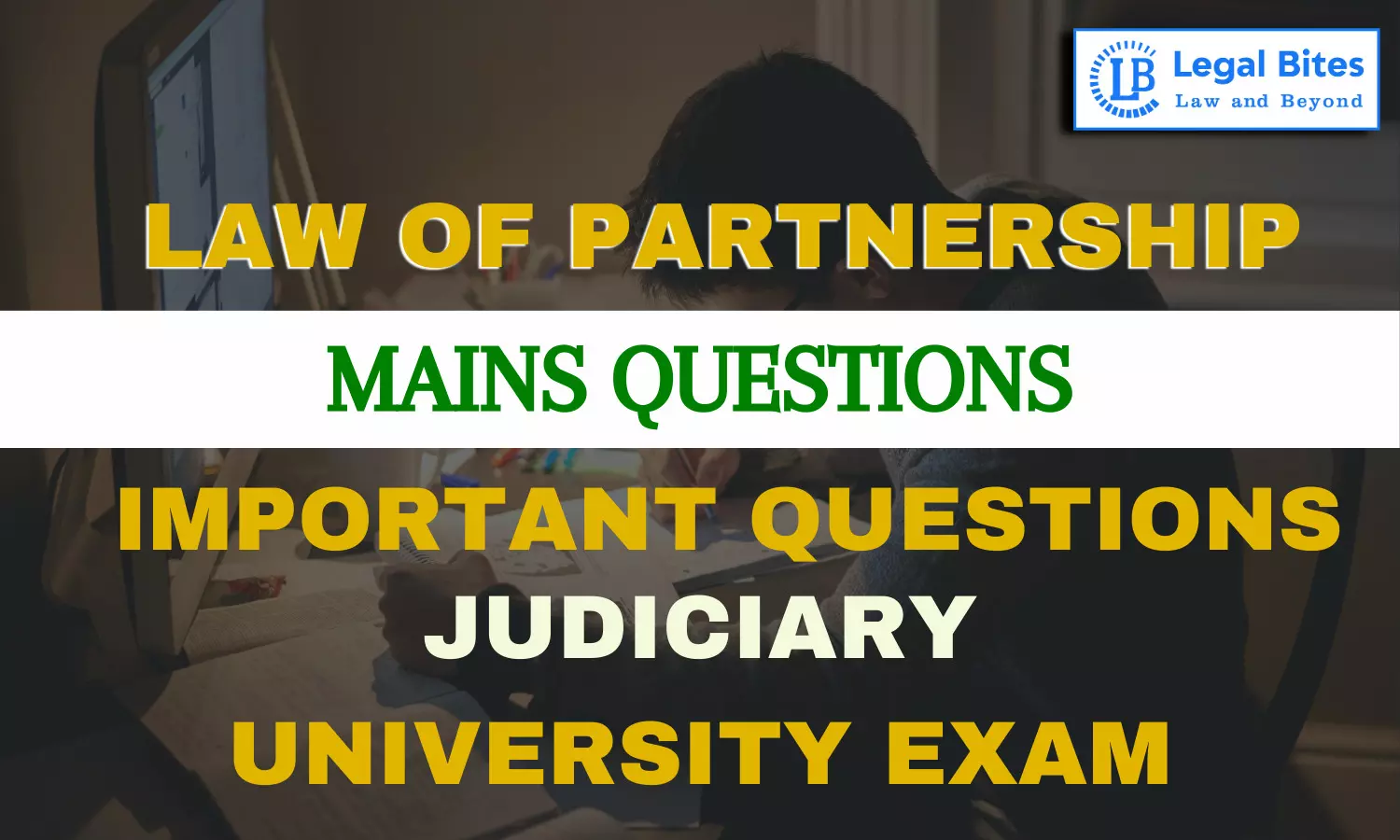Define Partnership and discuss the mode of determining its existence.
Find the answer to the mains question of the Law of Partnership only on Legal Bites.

Question: Define Partnership and discuss the mode of determining its existence. [BJS 1986]Find the answer to the mains question of the Law of Partnership only on Legal Bites. [Define Partnership and discuss the mode of determining its existence.]AnswerAccording to the Indian Partnership Act, 1932, a partnership is defined as the relation between two or more persons who have agreed to share the profits of a business carried on by all or any of them acting for all. The individuals who form...
Question: Define Partnership and discuss the mode of determining its existence. [BJS 1986]
Find the answer to the mains question of the Law of Partnership only on Legal Bites. [Define Partnership and discuss the mode of determining its existence.]
Answer
According to the Indian Partnership Act, 1932, a partnership is defined as the relation between two or more persons who have agreed to share the profits of a business carried on by all or any of them acting for all. The individuals who form a partnership are collectively called "partners," and the partnership itself is known as a "firm. Section 4 of the Indian Partnership Act defines Partnership.
To determine the existence of a partnership, several factors are considered. Section 6 describes the mode of existence of a partnership. It says,
In determining whether a group of persons is or is not a firm, or whether a person is or is not a partner in a firm, regard shall be had to the real relation between the parties, as shown by all relevant facts taken together.Explanation 1.--The sharing of profits or of gross returns arising from property by persons holding a joint or common interest in that property does not of itself make such persons partners.Explanation 2.--The receipt by a person of a share of the profits of a business, or of a payment contingent upon the earning of profits or varying with the profits earned by a business, does not of itself make him a partner with the persons carrying on the business;and, in particular, the receipt of such share or payment--(a) by a lender of money to persons engaged or about to engage in any business,(b) by a servant or agent as remuneration,(c) by the widow or child of a deceased partner, as annuity, or(d) by a previous owner or part owner of the business, as consideration for the sale of the goodwill or share thereof,does not of itself make the receiver a partner with the persons carrying on the business.
Some common elements used to assess partnership include:
1) Two or more Persons: There must be at least two persons to form a partnership and all such persons must be competent to contract. According to Section 11 of the Indian Contract Act, 1872, every person except the following, is competent to contract:
(i) Minor
(ii) Persons of unsound mind (e.g. lunatics, idiots), and
(iii) Persons disqualified by law (e.g., alien enemies, insolvents)
2) Agreement: Partnership must be the result of an agreement between two or more persons. An agreement from which the relationship of Partnership arises may be expressed. It may also be implied from the act done by partners and from a consistent course of conduct being followed, showing mutual understanding between them. This essential element is further clarified under Section 5. Section 5 provides that the relation of partnership arises from contract and not from status.
3) Business: There must exist a business. According to Section 2(b), the term ‘Business’ includes every trade, occupation and profession.
4) Sharing of Profits: There must be sharing of profits. Unless otherwise agreed, sharing of profits implies sharing of losses too. Sharing of profits is a prima facie evidence and not conclusive evidence of partnership
5) Mutual Agency: There must existence of a mutual agency relationship among the partners. A 'Mutual Agency' relationship means that each partner is both an agent and a principal. Each partner is an agent in the sense that he has the capacity to bind other partners by his acts. The mutual relationship of the agency is emphasised in Section 18 of the Indian Partnership Act, which reads as under:
"Subject to the provision of this Act, a partner is the agent of the firm for the business of the firm."
Lord Cranworth in the case of Cox v. Hickman (1860) 8 H.L. 268, stated
“Participation in profits is not the decisive test of a partnership”.

Mayank Shekhar
Mayank is an alumnus of the prestigious Faculty of Law, Delhi University. Under his leadership, Legal Bites has been researching and developing resources through blogging, educational resources, competitions, and seminars.
